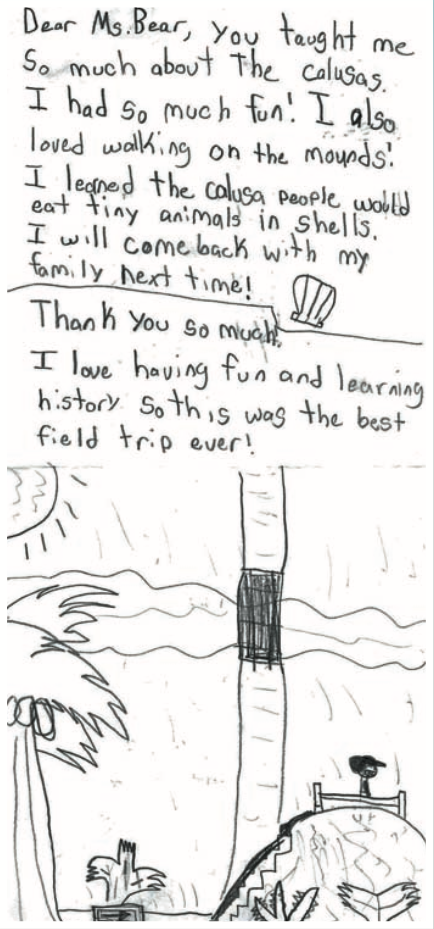For students from impoverished homes, school field trips may be their only access to the community beyond their neighborhoods. Research shows that educational field trips increase student engagement and help teach facts and concepts. Research on the value of learning outdoors has demonstrated benefits as varied as greater concentration and higher levels of “happiness” among students of all ages.
But field trip costs can be a significant barrier that prevents teachers from getting students to places that connect and extend classroom teaching. In Florida’s social studies curriculum, grade 4 is the time when students are being introduced to Native Florida people, and the Calusa Heritage Trail is an ideal destination for supporting those studies. However, while teachers face financial barriers, we face a barrier of too few staff to instruct students, especially since it is most cost effective to have two classes of students travel on one bus, meaning fifty or more students for each field trip!
 Enter Judith and Tim Sear, RRC supporters with a keen interest in insuring that students have access to quality learning opportunities regardless of financial situation and who both hold an appreciation for archaeological research and preservation. In school year 2016-2017, Judith and Tim funded a pilot program that covered costs for all fourth graders of three local schools identified as being Title One schools. At Title One schools, a high percent of students live in poverty.The funds paid for bus transportation and allowed us to hire part-time instructors and prepare student materials. The schools had to be within a 30-minute drive because field trip buses are only avail- able between 9:30 a.m. and 1 p.m. and we needed adequate time for the activities.
Enter Judith and Tim Sear, RRC supporters with a keen interest in insuring that students have access to quality learning opportunities regardless of financial situation and who both hold an appreciation for archaeological research and preservation. In school year 2016-2017, Judith and Tim funded a pilot program that covered costs for all fourth graders of three local schools identified as being Title One schools. At Title One schools, a high percent of students live in poverty.The funds paid for bus transportation and allowed us to hire part-time instructors and prepare student materials. The schools had to be within a 30-minute drive because field trip buses are only avail- able between 9:30 a.m. and 1 p.m. and we needed adequate time for the activities.
Teachers at the identified schools applied for the opportunity and all fourth graders from Hector Caferrata, J. Colin English, and Caloosa elementary schools participated. Throughout the day they took part in hands-on activities exploring how archae- ologists use excavated fish bones to learn about past environments, climbing midden mounds to learn how they were con- structed, making their own inferences about how tools were used by examining replicas, and using the illustrated trail signs as portals to the past to see Pineland as the busy town it once was.
The dozens of thank you notes we received were rife with evidence of how much the trip meant to the students. Eleana from Ms. Lally’s class at Caloosa Elementary wrote, “Before I only knew a few things about the Calusa, I learned a lot. I saw how to make a net. I was amazed how they did it.” Matthew added, “It was a very neat experience there was a lot of nature around me.” and Kyle added, “I am so grateful for this trip.” The RRC staff and volunteers noted benefits too, including building partner- ships with area schools and being reminded of the creativity of children.
With firm evidence that the program was a success, and with the pieces in place for it to continue, Judith and Tim have established the Judith and Tim Sear Family Endowment, which will generate income in perpetuity for these field trips to targeted student groups. Like Kyle, we are so grateful!
We acknowledge and appreciate the assistance of the great staff at the Lee County School District’s Transportation North, in particular Jennie Boling. At the district’s administrative office, Lucy Best helped with accounting and Dr. Teri Kinsey with the Grants Office helped smooth the way. RRC volunteers Maddie Stewart and Gayle Sheets assisted with every field trip and Diana Stockbridge and Zach Diamond were our trusty, able, instructor assistants. We appreciate all teachers and look forward to hosting many this school year!